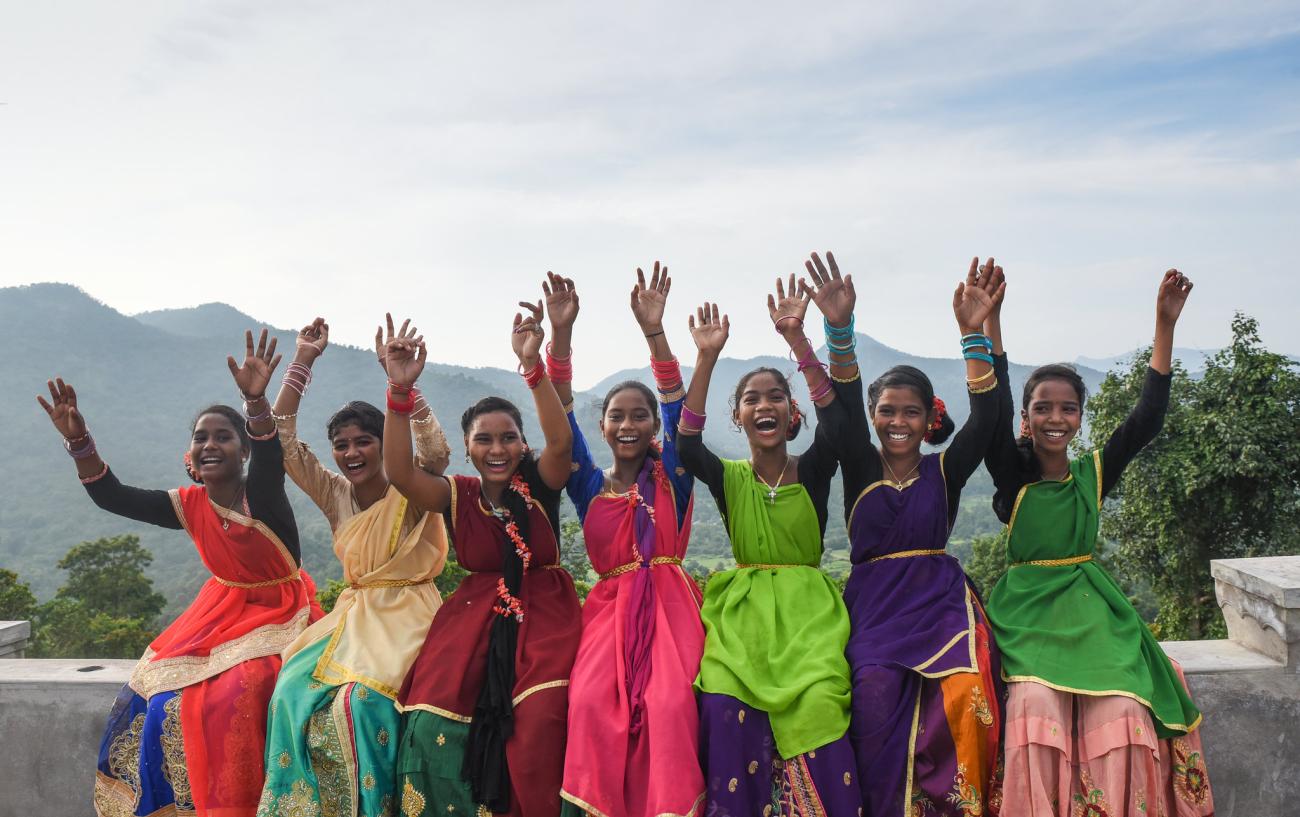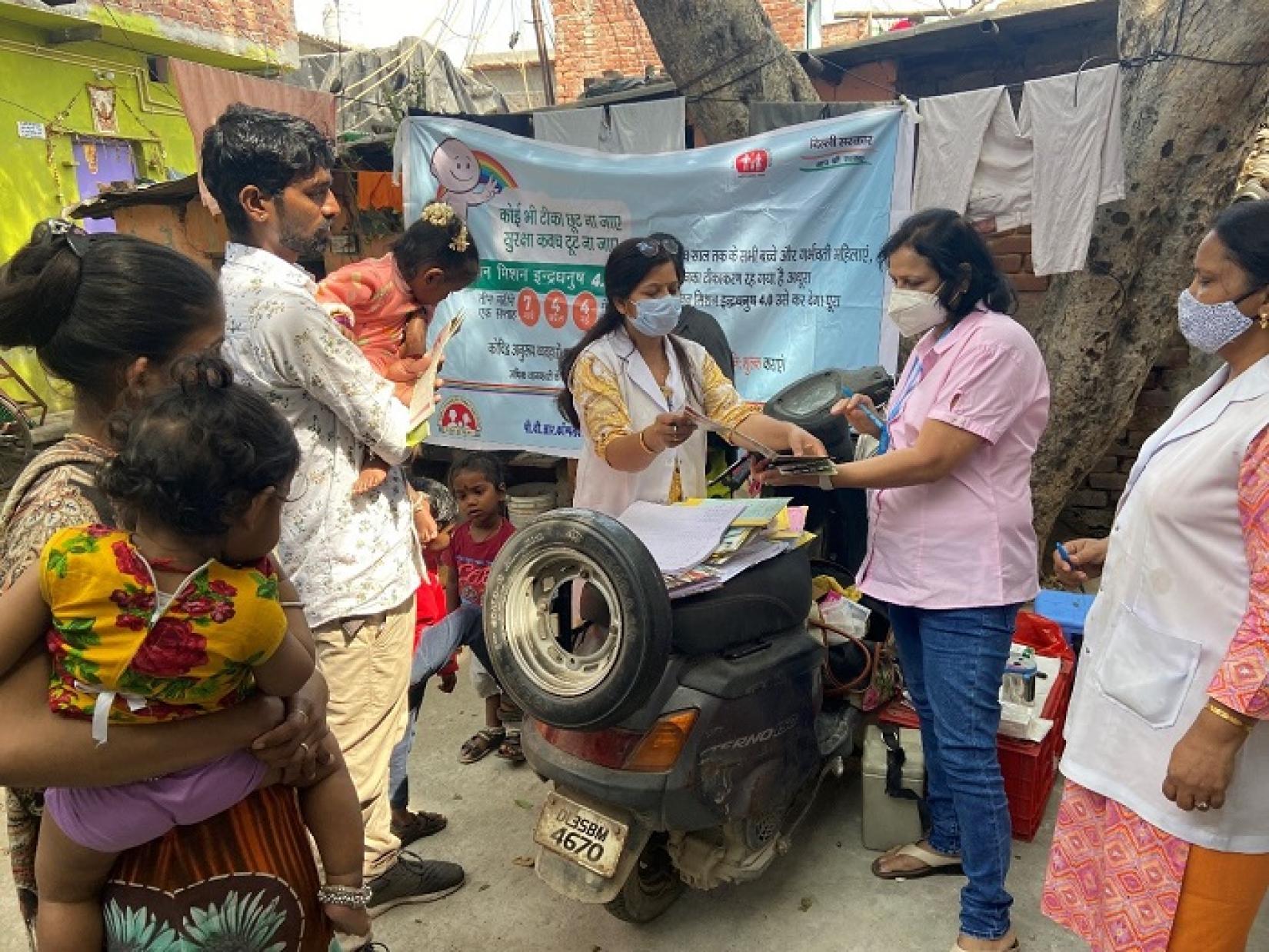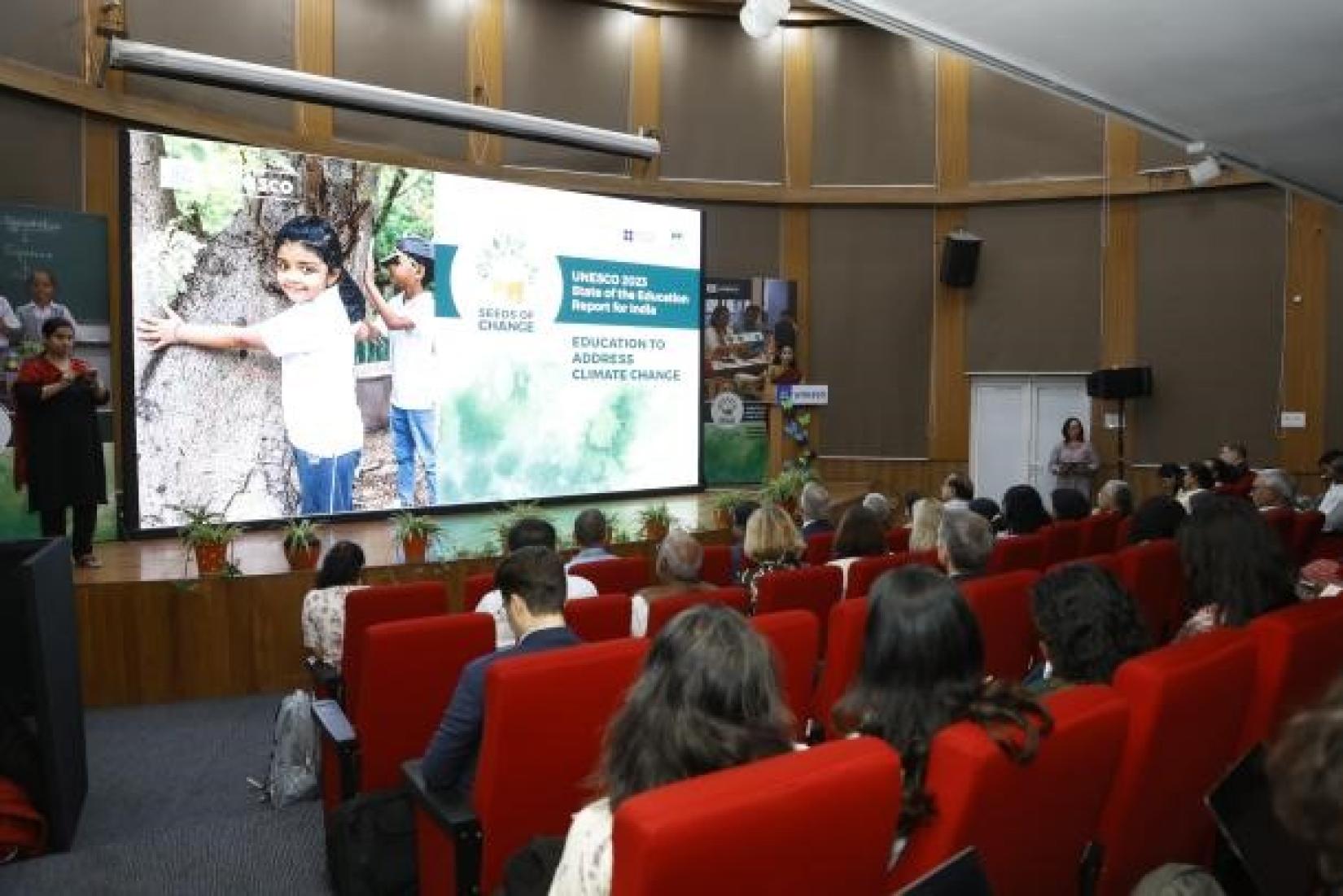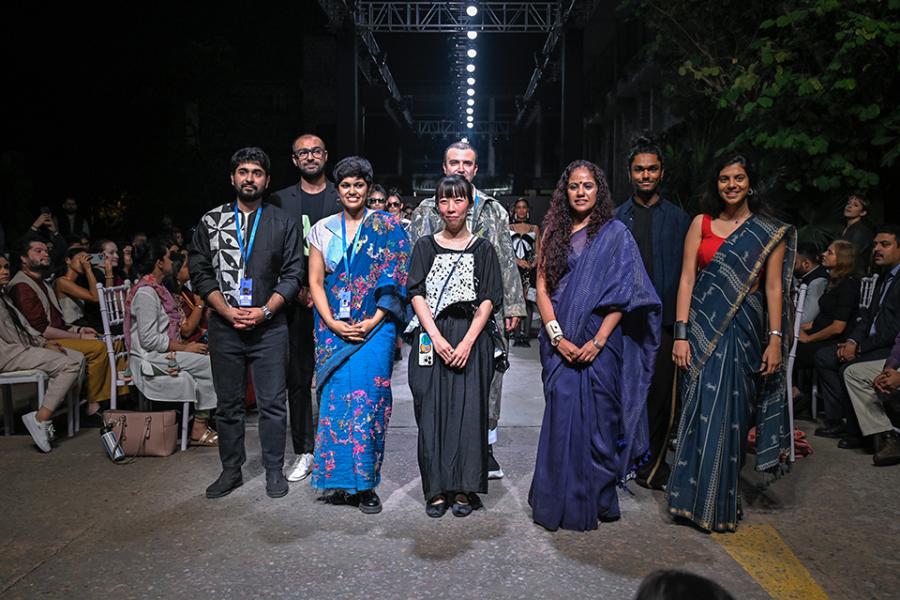Celebrating a milestone year in the UN-India Partnership!

The United Nations in India looks back on a memorable year of achievements in support of India and its development agenda
|
Dear Friends,
This past year has been a truly momentous one for India – and for the UN in India.
From taking the mantle as the world’s most populous country, to the successful landing of the Chandrayaan-3 mission, to hosting the Cricket World Cup, and perhaps most significantly, the G20 Presidency, all eyes were on India this year.
Yet the year began under no small amount of global headwinds. Multilateralism itself has been fraying at the seams, pulled apart by a number of challenges, including the war in Ukraine, and more recently renewed conflict in the Middle East.
And at the midpoint of the 2030 Agenda for Sustainable Development, the UN Sustainable Development Goals Summit held in New York in September confirmed what many development practitioners had long sounded a warning on – the SDGs are dramatically off course, with only fifteen percent on track, with nearly a third ground to a halt or even in reverse gear.
Against this backdrop, India demonstrated much-needed leadership at home and on the international stage, delivering development solutions at scale and helping build an inclusive consensus across divides. The UN in India was privileged to be a partner at many levels.
|
|
At this critical juncture, India’s G20 Presidency refocused the G20 on taking greater responsibility for putting the 2030 Agenda’s time-bound targets back on track and the voice of the Global South on centre stage. This included bringing greater alignment between climate action and the development agenda, and raising ambitions on reform of the multilateral system, including the international financial architecture, and accelerating digital transformations. In addition, the Presidency stressed the need for a more women-led development across multiple workstreams.
India’s G20 featured stronger coordination and alignment between the UN and the Presidency than perhaps any G20 to date. In response to government invitation, the UN in India was proud to play an important role in that partnership, complimenting the leadership of the DESA Under Secretary-General as overall Sherpa for the UN system and the UNDP Administrator as lead on the Finance Track.
A number of UN agencies and the RCO were privileged to support different Working Groups through partnerships with leading line ministries and the G20 Secretariat. This collaboration included contributing technical inputs to issue notes and other processes, as well as helping deliver side sessions and providing specialist human resources and other support at government request.
Despite extensive geopolitical challenges, India’s G20 Presidency managed to successfully advance a number of key priorities, including those highly valued by the UN system, through the consensus New Delhi Leader’s Declaration and other prior deliverables. This included the new G20 Action Plan to Accelerate Progress on the SDGs, commitments to triple global capacity in renewable energy, raising ambitions on MDB reform, very much in line with the UN Secretary General’s call for an SDG Stimulus, as well as the strongest-ever gender equality language of any G20 Leaders’ Declaration, including setting the stage for a new ministerial level G20 Working Group on Gender Equality to be taken forward by Brazil. Together with its solidarity with the Global South, exemplified by the inclusion of the African Union in the G20, the Indian G20 Presidency took critical steps towards a fairer and more effective multilateralism.
|
|
The year also saw the launch of the first new-generation Government of India - UN Sustainable Development Cooperation Framework 2023-27 (SDCF), strategic articulation of the overall India-UN country partnership, and the guiding instrument for UN system support to India’s SDG achievement delivered jointly through individual UN Agency country programmes.
The SDCF was the product of an extensive and inclusive multi-agency and multi-ministry year-long collaborative effort. I would particularly like to thank and acknowledge NITI Aayog for their substantive leadership and coordination as overall nodal counterpart, as well as the Ministry of External Affairs, different nodal ministries, UN agencies, civil society, and other partners, for their support and collaboration. This was truly a whole-of government, whole-of-society, and whole-of-UN effort.
|
|
And reflecting the increasingly two-way nature of our partnership, for the first time the SDCF has included South-South Cooperation as a key engagement priority. Our UN Country Team agencies will use their extensive knowledge of the Indian development landscape to help codify Indian best practices in key areas of South-South cooperation to partner in bringing those solutions to the global stage for the benefit of other countries.
As a vehicle for this support, we are launching our first-ever country-level SDG pooled fund, with South-South Cooperation as the first window. A Letter of Intent with the Bill and Melinda Gates Foundation for initial funding was signed in New York in the presence of the External Affairs Minister on the margins on the UN General Assembly.
|
India’s Mission LiFE, which was launched by the Honourable Prime Minister Narendra Modi together with UN Secretary-General António Guterres in Gujarat last year, also received coordinated support from the UN India team. Not only was LiFE incorporated into our new SDCF, but UNEP, through the One Planet Network, supported efforts to develop the High-Level Principles of LiFE, which in turn anchored the initiative to all G20 working groups across climate and energy transition themes.
UN agencies, including UNEP and UNDP, helped mobilise partner networks for LiFE, and supported the shortlisting of candidates for the global call for LiFE ideas announced by PM Modi. UNDP also supported the Presidency on the priority area around Blue Economy, which led to the formulation and adoption of the Chennai High-Level Principles for a Sustainable and Resilient Blue/Ocean-based Economy.
|
|
|
|

|
|
|||||||||
| ------------------------------------------------------------------------------------------------------------------------------------------------------------------------------------------------------------------ | |||||||||
|
We continued to support the strengthening of Reproductive, Maternal, New-born, Child, and Adolescent Health (RMNCHA) services. Constant advocacy, implementation support, and regular mentoring from UNICEF, UNFPA and WHO has contributed to the improvement of India’s institutional delivery rate, which is now at over 90 percent.
UN agencies, led by UNICEF, also provided technical assistance, wide-ranging capacity building, and promotion of safe practices to improve Water and Sanitation (WASH) services, including support to the flagship Jal Jeevan and Swachh Bharat missions and improving facilities in refugee settlements.
UN advocacy, policy support and evidence generation continued to support the Government’s leadership push for better nutrition outcomes in 2023, including through support to Nutrition Rehabilitation Centres (NRCs) for children with Severe Acute Malnutrition, Iron folic acid (IFA) supplementation, and the mainstreaming of fortified rice. |
|||||||||
|
|
| Read more |

| Through the year, we supported government efforts to ensure that all children gain strong foundations in basic skills like reading and maths, as well as strong support to the Ayushman Bharat School Health and Wellness Programme by UNESCO, UNFPA, and UNICEF. Recognizing the critical link between education and fighting climate change, UNESCO’s flagship State of the Education Report 2023 focused on the role Indian teachers can play in fostering environmental education. | |
|
| This year we also celebrated the inscribing of two new Indian sites to the UNESCO World Heritage List, with the historic West Bengal town of Santiniketan and the Sacred Ensembles of the Hoysalas, a series of 12th- and 13th-century temples in Karnataka. This now brings the number of World Heritage Sites in India to 42, among the highest in the world. The Garba of Gujarat, a ritualistic and devotional dance performed on the occasion of the Hindu festival of Navaratri and dedicated to the worship of the feminine energy or ‘Shakti’, was also inscribed in 2023. | |
|
UN agencies also continued to advocate for economic growth and decent work for all women and men. Led by the International Labour Organization (ILO), the UN’s specialized agency promoting decent work, together with UN Women, UNDP, UNIDO and UNHCR, the agencies worked with MSMEs to develop innovation and technology ecosystems, safe, orderly, and regular migration, social protection systems, and linkages to green jobs.
Our agencies also took steps towards improving institutional responses for survivors of gender-based violence (GBV), including continued support to One Stop Centres which provide support to women affected by violence. India’s hosting of the first Regional Asia-Pacific Conference on Access to Legal Aid in November, part of the global push to implement the UN Principles and Guidelines on Access to Legal Aid, was an important step in guaranteeing legal aid for the most vulnerable.
And we continued supporting India’s just green transition and resilience to climate change, working to ensure the collection and processing of plastic waste, adoption of renewable energy solutions, green economic growth, the conservation and management of biodiversity and much more. The Partnership for Action on Green Economy (PAGE), has brought together five agencies and eight line ministries is supporting India’s green economic transformations across diverse sectors from sustainable public procurement to green manufacturing and eco-labelling.
This year also saw many high-level visits with India at the centre. To start the year, the then President of the General Assembly Csaba Kőrösi made India his first bilateral visit since assuming office, with a focus on G20 priorities and sustainable water use.
The UNDP Administrator visited India twice as part of the G20. UNICEF Executive Director Catherine Russell also met with senior government officials and frontline health workers, UNEP Executive Director Inger Andersen joined the G20 Environment and Climate Ministers’ Meeting, while Mr Jean Todt, the UN Secretary-General's Special Envoy for Road Safety, visited India to advocate for road safety and the UN Road Safety Convention.
The UN Secretary-General took part in the G20 Leaders’ Summit, reaffirming his belief in the centrality of India to achieving the SDGs globally. From the UN House in New Delhi, the Secretary-General delivered an urgent message to G20 leaders to come together to keep the 1.5 degree goal alive and ensure the SDGs are achieved on schedule. He also called on G20 leaders to ensure solidarity with the Global South, from financial support for the green transition to reforming the dysfunctional global financial architecture. The Secretary-General welcomed the consensus, SDG-focused New Delhi Declaration.
Deputy Secretary-General (DSG) Amina Mohammed also paid an official visit to India for the first time in her second term. During her visit, the DSG met with the External Affairs Minister, Finance Minister, Vice Chairman of NITI Aayog, and many other leading officials. The DSG also visited Bengaluru where she interacted with experts in premiere technology research institutions to learn how digital technology can drive development in the Global South.
| Among a number of celebrity advocates and Goodwill Ambassadors, football legend and UNICEF Goodwill Ambassador David Beckham thrilled fans with a trip to India, joining hands with cricketer Sachin Tendulkar to celebrate UNICEF’s partnership with the International Cricket Council (ICC) to empower girls and women through cricket. | |
|
|

With this in mind, it was a great honour for the UN House to host the fifth Circular Design Challenge by R|Elan™ at Lakmé Fashion Week. The sustainable fashion show, a celebration of creativity and colour, as well as circular solutions, was an unforgettable night for all involved, and remains one of the highlights of our year.
I also had the opportunity to help strengthen the partnership with the Indian Army Peacekeeping leadership and the Centre for UN Peacekeeping on several important occasions. One of the highlights was accepting nearly 150 Made-in-India armoured vehicles, an excellent example of‘ Aatmanirbhar Bharat’, on behalf of the UN for the UN peacekeeping operation in South Sudan. I was also privileged to participate in the 75th anniversary of UN Peacekeeping celebration, recognizing India’s role having contributed more personnel to UN Peacekeeping since the beginning than any other country, and joining the Indian Army in paying homage to fallen heroes at the National War Memorial.
The UN in India was also honoured to partner with the International Indian Film Academy Awards held in Abu Dhabi. We are always looking for new platforms to get our message across, and the award show was an opportunity for the UN to amplify the message on climate action and sustainability to an entirely new audience, leveraging the power of India’s cultural ‘soft power’ for good.
Our own UN family was also strengthened by the opening of the new International Telecommunication Union (ITU) Regional Centre in Delhi in March 2023, with the goal of promoting advanced technologies within the region and beyond. We look forward to India’s hosting of the ITU World Assembly in 2024.

















